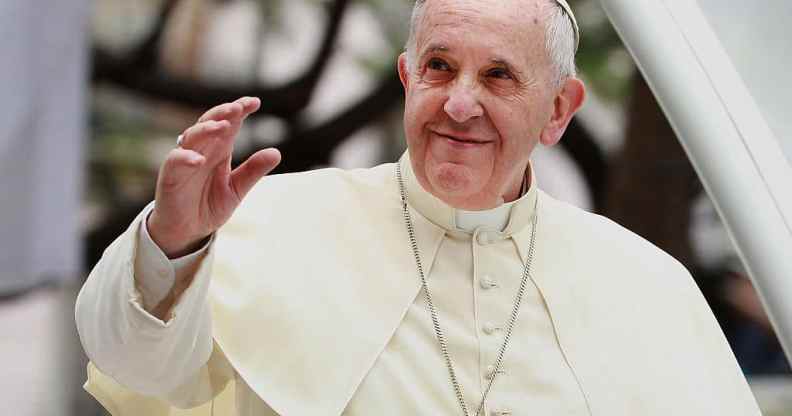Bible passages justifying homophobia have been woefully ‘misinterpreted’, damning study finds

Pope Francis. (Getty/ Lisa Maree Williams)
Claims that the Bible condemns same-sex relationships are based on misinterpretations and mistranslations, a groundbreaking theological study has found.
The report, titled “Christian Objections to Same-Sex Relationships: An Academic Assessment”, saw 20 biblical scholars, theologians, ethicists, evolutionary biologists and sociologists come together to disprove the foundations upon which the Catholic Church built its anti-LGBT+ stance.
The 80-page study, which was conducted by the Wijngaards Institute for Catholic Research, should “serve as the final nail in the coffin of biblical and other arguments justifying homophobia”, a press release said.
The report found that passages in Leviticus often cited as the most explicit condemnations of homosexuality have actually been mistranslated.
In fact, those passages only condemn incest and adultery between men, while no mention is made of sexual relationships between women, the study found.
Prohibiting incest and adultery between men suggests that same-sex relationships “outside the forbidden category” were actually viewed as permissible.
The scholars found that “consensual and faithful” same-sex relationships are not condemned anywhere in the Bible, and natural sciences firmly attest that homosexuality is a “natural variation within the range of human sexuality”.
Presenting their findings, the scholars called on Pope Francis and the Vatican to take urgent action to change church teaching on same-sex relationships.
They specifically criticised the Vatican’s recent decision to ban blessings for same-sex couples, arguing that the ruling vilifies same-sex couples.
The scholars urged the Vatican to set in motion a transparent, independent consultation process on their findings in a bid to move forward in an evidence-based way.
Mary McAleese urges the Catholic Church to ‘open its eyes and ears’
The report has been endorsed by more than 60 high-profile academic scholars from across the world, including former Irish president Mary McAleese.
McAleese, a Catholic who has campaigned tirelessly for the Catholic Church to change its teaching on LGBT+ issues, said the study should “challenge, probe and interrogate church teaching in the area of homosexuality.”
She said: “The people of God have needed this to help convince a blinkered magisterium to open its eyes and ears, to see and hear the damage inflicted on good people young and old by teachings that run counter to science and counter to the love of the creator. The scholarly work of the Wijngaards Institute brings hope where it is needed.”
McAleese’s sentiments were echoed by Reverend Krzysztof Charamsa, a Polish Catholic theologian, who said the report is “a gift and a commitment to the Church”.
“Theologians, aware of their scientific and Christian responsibility, address themselves to helping the judgement of the Church to mature… By presenting the progress of the humanities and biblical sciences, the signatories perform an act of intellectual honesty and trust in the Church.”
The Catholic Church has held firm on its position for decades that homosexuality is “intrinsically disordered” – despite repeated calls from church members to re-evaluate.
Some had hoped that the Catholic Church would gradually begin to relax its rules when Pope Francis became leader of the institution in 2013.
But while the pontiff has taken a slightly more moderate approach to the LGBT+ community, change has remained a distant dream.
There was widespread disappointment among LGBT+ Catholics in March when the Vatican’s Congregation for the Doctrine of Faith (CDF) issued a statement banning priests from blessings same-sex couples.
In the highly-controversial statement, the CDF said God loves all his children, but claimed he “cannot bless sin”.

